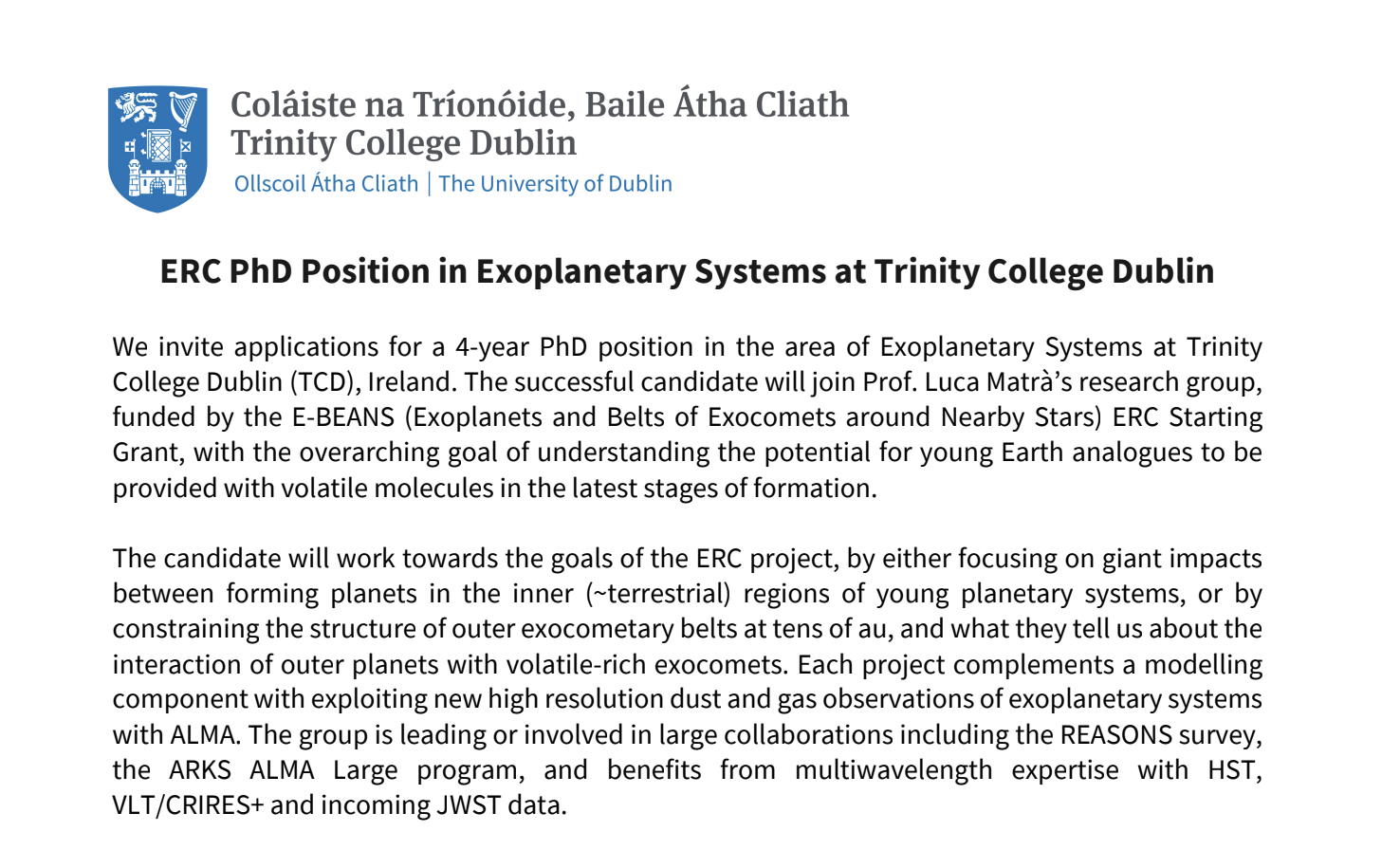
We invite applications for a 4-year PhD position in the area of Exoplanetary Systems at Trinity College Dublin (TCD), Ireland. The successful candidate will join Prof. Luca Matrà’s research group, funded by the E-BEANS (Exoplanets and Belts of Exocomets around Nearby Stars) ERC Starting Grant, with the overarching goal of understanding the potential for young Earth analogues to be provided with volatile molecules in the latest stages of formation.
ERC PhD Position in Exoplanetary Systems
Trinity College Dublin, Ireland
We invite applications for a 4-year PhD position in the area of Exoplanetary Systems at Trinity College Dublin (TCD), Ireland. The successful candidate will join Prof. Luca Matrà’s research group, funded by the E-BEANS (Exoplanets and Belts of Exocomets around Nearby Stars) ERC Starting Grant, with the overarching goal of understanding the potential for young Earth analogues to be provided with volatile molecules in the latest stages of formation.
The candidate will work towards the goals of the ERC project, by either focusing on giant impacts between forming planets in the inner (~terrestrial) regions of young planetary systems, or by constraining the structure of outer exocometary belts at tens of au, and what they tell us about the interaction of outer planets with volatile-rich exocomets. Each project complements a modelling component with exploiting new high resolution dust and gas observations of exoplanetary systems with ALMA. The group is leading or involved in large collaborations including the REASONS survey, the ARKS ALMA Large program, and benefits from multiwavelength expertise with HST, VLT/CRIRES+ and incoming JWST data.
Applicants must have, by the start date (nominally September 1st 2024), have achieved a 1st or upper 2nd class (I or II.I, or equivalent: http://tiny.cc/grtab) in a Masters or 4-year undergraduate degree, in Astrophysics or related field. Previous research experience is required, with preference given to applicants with expertise in either planetary impacts, exocometary belts or more broadly in planet formation/circumstellar disks and/or mm/radio interferometry observations.
The full-time PhD studentship is nominally open to EU/EEA/UK-based applicants, though full consideration will be given to exceptional non-EU candidates. The position is fully funded for 4 years, covering tuition fees and a tax-free stipend of 25000 EUR/year, as well as a laptop/computer and work-related travel costs. The nominal start date is September 1st, 2024, but a later starting date can be negotiated. The group has access to dedicated computing servers, as well as local and national high-performance computing facilities.
Applicants should submit a CV (max 2-pages), including the names of two referees which will be contacted if shortlisted, and a research statement (max 1-page) outlining their academic experience and motivation for pursuing a PhD in Astrophysics. Complete applications received by the application deadline of February 20th, 2024 will receive full consideration. Applications from traditionally under-represented minorities in physics and astronomy are particularly welcome.
Applications, as well as any queries, can be submitted via email to astrojobs@tcd.ie – please include ‘Exoplanetary Systems PhD application’ in the subject heading. Full details available at http://tinyurl.com/phdexosystcd